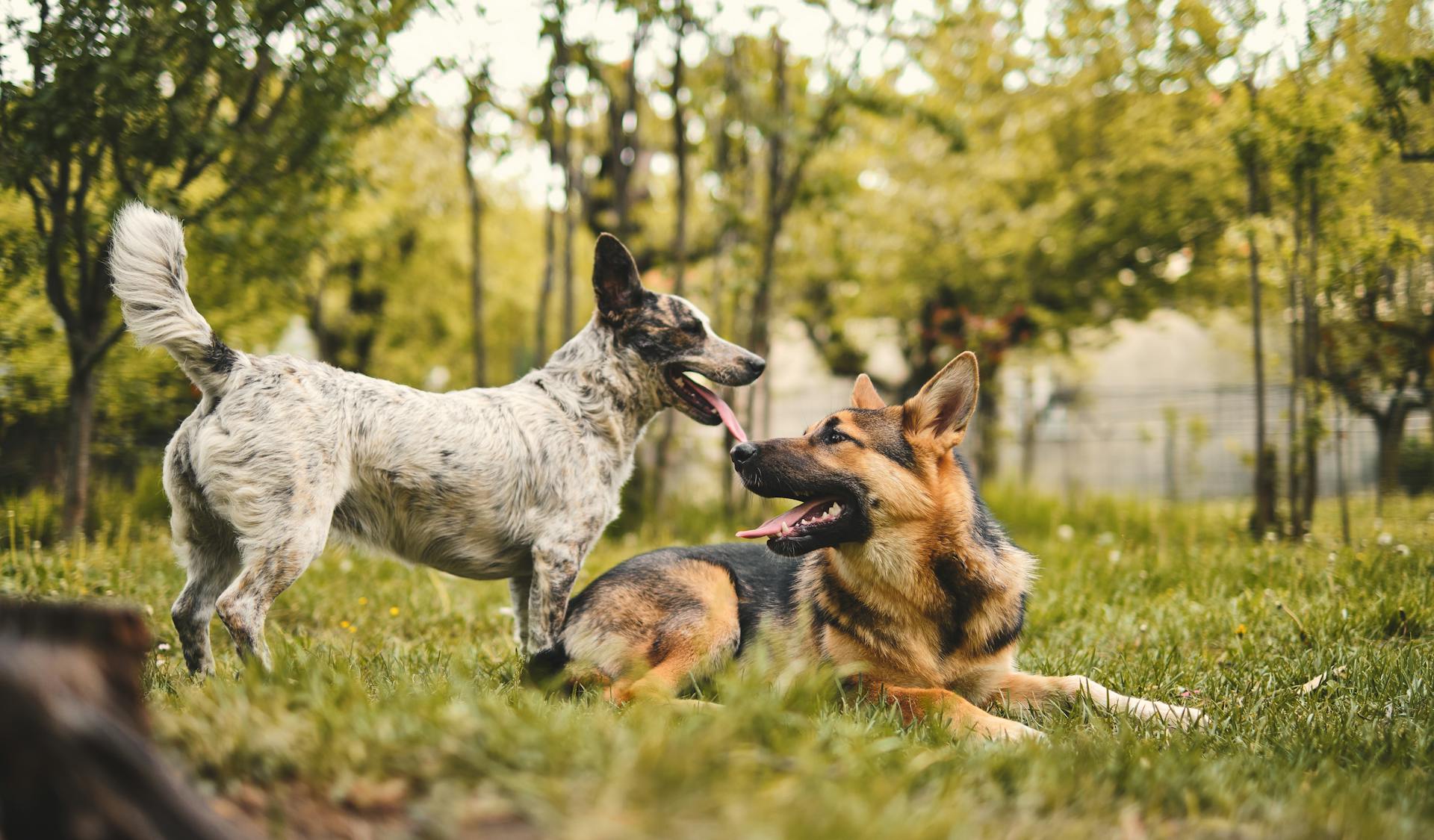
Dogs can thrive on a variety of drinks besides water, but it's essential to choose options that are safe and nutritious.
Cows' milk is not a suitable substitute for dogs, as they lack the enzyme lactase to digest lactose.
Some dogs can benefit from drinking coconut water, which is rich in electrolytes and can help with hydration.
Dogs can also drink small amounts of low-sodium chicken broth as an occasional treat, but it's crucial to choose a low-sodium option to avoid overloading their system with salt.
Alternatives to Water
Dogs can drink almond milk in small amounts, but be sure to check the label for xylitol and avoid chocolate flavored varieties. A teaspoon for small dogs or a tablespoon for large dogs once a week is a safe amount.
Unsalted broth is a great alternative to water, and you can make it at home by boiling liver or chicken in water. Just be sure to avoid adding salt and using unsafe fruits like grapes.
Some other options include bone broth, chicken broth, and vegetable broth, all of which can be made at home with safe ingredients. For example, bone broth is rich in nutrients like glucosamine and hyaluronic acid that can benefit a dog's coat and joint health.
Here are some key benefits of these alternatives:
- Helps encourage your dog to stay hydrated
- High in collagen and beneficial vitamins and minerals
- May help improve skin and coat health
Can Dogs Have Almond Milk?
Dogs can have almond milk in small amounts, but be sure to check the label for added sugars or sodium.
Some brands of almond milk have a higher fat concentration than others, so it's essential to choose a low-fat option.
A teaspoon for a small dog or a tablespoon for a large dog once a week is a safe amount.
Avoid sharing chocolate flavored almond milk with your dog, as it contains cocoa, a known toxin for dogs.
Most major brands of almond milk do not contain xylitol, but it's always best to double-check the label.
If you're unsure about what type of almond milk to give your dog, consult with your veterinarian for personalized advice.
Discover more: Dogs Drink Spoiled Milk
Unsalted Broth
Unsalted broth is a great alternative to water for your furry friend. It's a strong broth aroma that will draw your pooch in, hydrating them in no time.
You can make your own unsalted broth at home by boiling liver or chicken in plenty of water, or buy pet-safe broth from the store. Just be sure to check the ingredients list to ensure it's free from salt and other additives.
Some common ingredients used to make unsalted broth include chicken, beef, or bone broth. You can also use vegetable broth as a low-calorie alternative.
Here are some benefits of unsalted broth for your dog:
- Helps encourage your dog to stay hydrated
- Can be used as a treat or a dog food topper if you give your dog kibble
- Rich in various nutrients that can be beneficial to dogs, such as glucosamine, hyaluronic acid, and collagen
Remember, always choose unsalted broth specifically made for dogs, and avoid using unsafe fruits like grapes or citrus-based juices like oranges.
Tailoring Hydration for Your Pup
For most dogs, regular water is the best and safest option. It's not common for dogs to get bored with water like we do.
However, offering occasional alternatives can add some excitement to their daily routine. Just remember to keep it in moderation.
A splash of coconut water after a long walk can be a nice touch. But always keep an eye on their overall diet.
Some human beverages are highly toxic to dogs, so never let them drink or eat alcoholic beverages or items.
Fruit and Vegetable Juices
Fruit and vegetable juices can be a healthy addition to your dog's diet, but it's essential to do it right. You can make your dog fruit or vegetable juice at home by blending water and fruits and vegetables safe for dogs.
Some good choices for fruits and vegetables are banana, blueberries, kale, carrots, and cucumber. Avoid using grapes, raisins, onions, garlic, avocado, citrus, or coconut, as they're toxic to dogs.
Dogs can benefit from the vitamins and minerals packed in fruit and vegetable juices. Most dogs enjoy the sweet taste, and these juices are low in fat.
Discover more: Dogs Eat Canned Vegetables
Here are some benefits of fruit and vegetable juices for dogs:
- Packed with beneficial antioxidants, vitamins, and minerals
- Most dogs enjoy the sweet taste
- Low in fat
However, it's crucial to remember that you have to make these juices at home to ensure no additives. Store-bought juices are not recommended due to added sugar and potential additives.
Other Options
If you're looking for alternatives to water, there are a few options worth considering. Coconut water is a great choice, as it's low in calories and fat-free, making it an excellent source of hydration for dogs.
For dogs that are lactose intolerant, almond milk can be a suitable alternative. Just be sure to choose an unsweetened and additive-free option. Some dogs may not enjoy the taste of nut milk, so it's essential to monitor their interest.
Here are some dog-friendly drink options in brief:
- Coconut water: A low-calorie, fat-free, and natural source of hydration.
- Almond milk: A suitable alternative for lactose intolerant dogs, as long as it's unsweetened and additive-free.
- Vegetable juice: Freshly squeezed juices from carrots or spinach provide essential vitamins and minerals without excess sugars.
If you're unsure about any of these options, it's always best to consult with your veterinarian for personalized advice.
Other Options
If you're looking for alternative hydration options for your dog, there are a few other choices you can consider. Almond milk can be a suitable alternative to regular milk for dogs, as long as it's unsweetened and free from additives.

A teaspoon of almond milk per small dog or a tablespoon per large dog once a week is unlikely to cause any issues. However, it's essential to note that some dogs may not enjoy the taste of nut milk and may not drink enough.
Coconut water is another low-calorie option that's rich in potassium, making it an excellent source of hydration for healthy dogs. It's also fat-free and contains natural electrolytes.
However, dogs with certain health conditions, such as kidney disease or hypoadrenocorticism (Addison's disease), should avoid coconut water due to its high potassium levels. Always check the label for added sodium and consult with your vet if you're unsure.
Some dogs may enjoy freshly squeezed vegetable juices, such as carrot or spinach juice, as a healthy addition to their diet. These juices provide essential vitamins and minerals without the excess sugars found in fruit juices.
For dogs that need a little extra help replenishing essential minerals or recovering from physical activity, there are electrolyte-enhanced drinks specifically formulated for canine consumption. These products are safe for your dog to consume and can provide the necessary support they need.
On a similar theme: Coconut Sugar
Puppy Milk
Puppy milk is a great alternative to cow's milk for dogs. It's designed specifically for dogs and is a source of protein, vitamins A and D, and calcium.
Some dogs can drink small amounts of cow's milk, but it's high in lactose, which can cause gastrointestinal upset. Adult dogs may struggle to digest lactose since they lack the necessary enzymes.
Puppy milk is high in fats, so it's not recommended for dogs with a history of pancreatitis.
Here's an interesting read: Can Dogs Have Only One Puppy
Can Milk?
Most adult dogs are lactose intolerant, meaning they can't digest cow's milk properly. This can cause diarrhea and stinky gas.
Some dogs can tolerate small amounts of milk, but it's essential to choose plain milk and avoid additives like chocolate or nutmeg. Watch out for potentially toxic substances!
Puppy milk is a great alternative, but it's high in fats, so not recommended for dogs with a history of pancreatitis.
Here's a quick rundown of milk options for dogs:
- Cow's milk: Not recommended for adult dogs due to lactose intolerance
- Puppy milk: High in fats, not recommended for dogs with pancreatitis
- Almond milk: Safe in small amounts, but check the label for additives
- Cashew milk: A suitable alternative, but ensure it's unsweetened and free from additives
If you're unsure about what's best for your furry friend, consult with your veterinarian for personalized advice.
Sources
- https://www.whole-dog-journal.com/health/what-can-dogs-drink-besides-water/
- https://pawsafe.com/blogs/dog-healthcare/what-can-dogs-drink-besides-water
- https://www.tasteofthewildpetfood.com/health/nutrition/can-my-dog-eat-beverages/
- https://www.dogster.com/dog-nutrition/can-dogs-drink-anything-other-than-water
- https://www.boredpanda.com/pet-wellness/dog-diet/what-dogs-can-drink/
Featured Images: pexels.com


